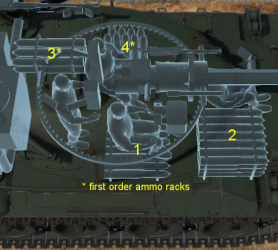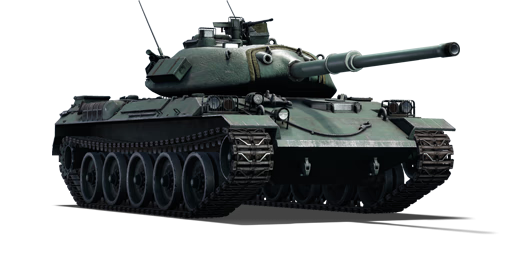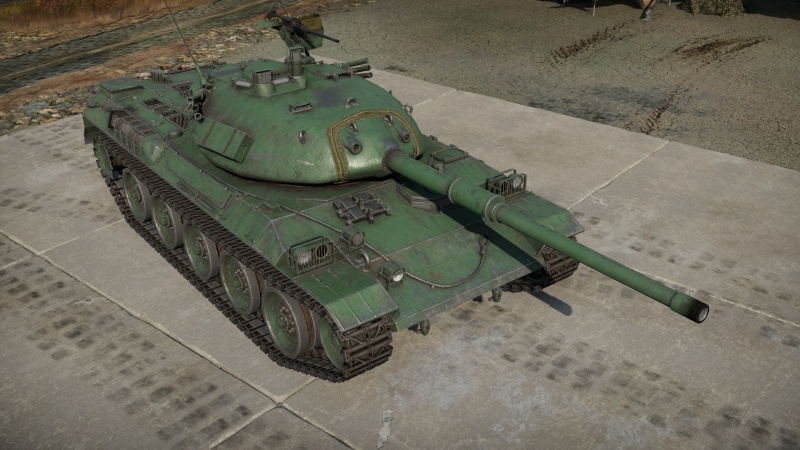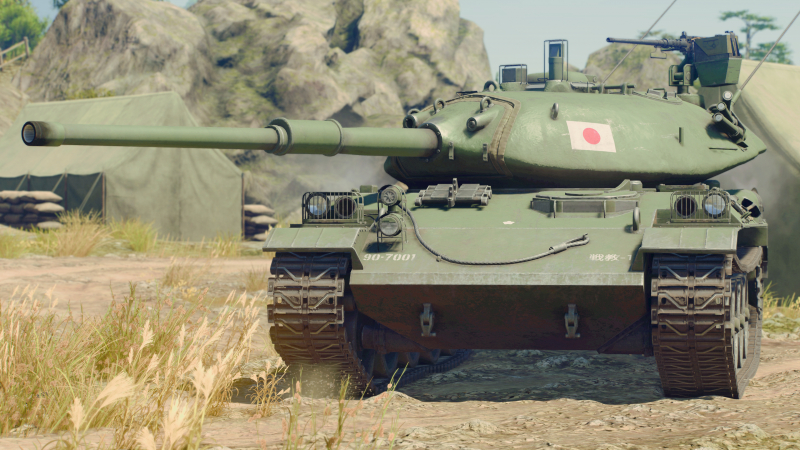Difference between revisions of "STB-2"
m (→Usage in battles) (Tag: Visual edit) |
|||
| Line 116: | Line 116: | ||
== Usage in battles == | == Usage in battles == | ||
<!-- ''Describe the tactics of playing in the vehicle, the features of using vehicles in the team and advice on tactics. Refrain from creating a "guide" - do not impose a single point of view but instead give the reader food for thought. Describe the most dangerous enemies and give recommendations on fighting them. If necessary, note the specifics of the game in different modes (AB, RB, SB).'' --> | <!-- ''Describe the tactics of playing in the vehicle, the features of using vehicles in the team and advice on tactics. Refrain from creating a "guide" - do not impose a single point of view but instead give the reader food for thought. Describe the most dangerous enemies and give recommendations on fighting them. If necessary, note the specifics of the game in different modes (AB, RB, SB).'' --> | ||
| − | The STB- | + | The STB-2 can be compared to the [[Leopard I]] or even a stock [[Leopard A1A1]], but has its own capabilities in its own right. The STB-2 allows for both a more held down playstyle or aggressive playstyle versus the Leopard I due to its [[Hydropneumatic suspension|hydropneumatic suspension]] and two-plane stabilizer. Together with the power of the engine outfitted on the STB-2, allows it to speedily move to a nice sniper spot or hull-down position and fire at targets before they realize a tank could be there. |
| − | The STB- | + | The STB-2 possesses a pretty nice angled upper front plate, but do keep in mind that the STB-2 wasn't designed to take a punch, only to deal a punch, so even with the good angle you shouldn't rely too heavily on it, as shells can penetrate it and won't always bounce off. Do keep this fully in mind especially when taking more shells with the vehicle, as the fuel tank next to the driver will be filled with extra shells, which can blow up the whole tank if a shell does eventually penetrate. |
| − | With the addition of a 12.7 mm machine gun, the STB- | + | With the addition of a 12.7 mm machine gun, the STB-2 can make short work of ZSU's or light tanks alike if the heat of the battle doesn't allow for the main gun or in-case of more important targets requiring the main gun's firepower. |
With only 2 shells to choose from being APDS & HESH, APDS can be used for long-distance engagements and HESH can deal with light to medium armoured vehicles with overpressure damage, this can be done at a long range once the laser rangefinder has been unlocked as well. But due to the low velocity of the HESH round it has to be fired at a stationary target at long range to effectively hit. | With only 2 shells to choose from being APDS & HESH, APDS can be used for long-distance engagements and HESH can deal with light to medium armoured vehicles with overpressure damage, this can be done at a long range once the laser rangefinder has been unlocked as well. But due to the low velocity of the HESH round it has to be fired at a stationary target at long range to effectively hit. | ||
Revision as of 12:56, 15 December 2023
Contents
Description
The STB-2 is the prototype of the Type 74, which was developed shortly after the introduction of the Type 61. Due to Japan's late entry into post-war tank development, they were behind by one tank generation and had to compare their Type 61s to more advanced tanks such as the T-62s, M60s and Leopard 1s. To keep up with these advancements, Japan sought to upgrade their tanks with the primary goal of incorporating the new standard L7 rifled cannon.
It was introduced in Update 1.65 "Way of the Samurai" along with the initial Japanese Ground Forces tree. Although the STB-1 has considerably more armour than its counterparts, such as the Leopard 1 and early AMX-30s, and has comparable mobility, it is not recommended for use as a front-line tank. Instead, it is best to employ a cautious hit-and-run tactic similar to that used with Leopards. Proper use of the tank's hydropneumatic suspension can improve its depression and, in some cases, aid in survivability. Additionally, the STB-1 is equipped with a laser rangefinder, giving it superior long-range capabilities over other tanks of its rank. This allows it to be highly accurate with low-velocity HESH or quickly acquire target range with APDS.
General info
Survivability and armour
| Armour | Front | Sides | Rear | Roof |
|---|---|---|---|---|
| Hull | 40-80 mm (64-73°) Front glacis 100 (26°), 80 mm (58-66°)Lower glacis |
35-40 mm (44°) Top 40 mm (0-55°) Bottom |
25 mm (1-46°) | 20 mm |
| Turret | 132 mm (12-66°) Turret front 100-200 mm (1-66°) Gun mantlet |
132 mm (1-54°) 75 mm (26-61°) Rear |
40 mm (1-64°) 40 mm (36-82°) Turret underside |
67 mm Front 20 mm Rear |
| Cupola | 30 mm | 30 mm | 30 mm | 30 mm |
Notes:
- Suspension wheels and tracks are 20 mm thick.
- Driver's vision port on the front glacis are only 50 mm thick.
- Hull roof is rated to be 54 mm effective against HE.
Mobility
| Game Mode | Max Speed (km/h) | Weight (tons) | Engine power (horsepower) | Power-to-weight ratio (hp/ton) | |||
|---|---|---|---|---|---|---|---|
| Forward | Reverse | Stock | Upgraded | Stock | Upgraded | ||
| Arcade | 59 | 9 | 37.8 | 1,348 | 1,660 | 35.66 | 43.92 |
| Realistic | 54 | 8 | 769 | 870 | 20.34 | 23.02 | |
Modifications and economy
Armaments
Main armament
| 105 mm L7A3 | Turret rotation speed (°/s) | Reloading rate (seconds) | |||||||||||
|---|---|---|---|---|---|---|---|---|---|---|---|---|---|
| Mode | Capacity | Vertical | Horizontal | Stabilizer | Stock | Upgraded | Full | Expert | Aced | Stock | Full | Expert | Aced |
| Arcade | 50 | -6°/+9° | ±180° | Two-plane | 22.8 | 31.6 | 38.4 | 42.5 | 45.2 | 8.71 | 7.70 | 7.10 | 6.70 |
| Realistic | 14.3 | 16.8 | 20.4 | 22.6 | 24.0 | ||||||||
Ammunition
| Penetration statistics | |||||||
|---|---|---|---|---|---|---|---|
| Ammunition | Type of warhead |
Penetration @ 0° Angle of Attack (mm) | |||||
| 10 m | 100 m | 500 m | 1,000 m | 1,500 m | 2,000 m | ||
| M392A2 | APDS | 350 | 347 | 333 | 317 | 302 | 287 |
| Type 75 | HESH | 127 | 127 | 127 | 127 | 127 | 127 |
| Shell details | ||||||||||||
|---|---|---|---|---|---|---|---|---|---|---|---|---|
| Ammunition | Type of warhead |
Velocity (m/s) |
Projectile mass (kg) |
Fuse delay (m) |
Fuse sensitivity (mm) |
Explosive mass (TNT equivalent) (kg) |
Ricochet | |||||
| 0% | 50% | 100% | ||||||||||
| M392A2 | APDS | 1,478 | 4 | - | - | - | 75° | 78° | 80° | |||
| Type 75 | HESH | 760 | 10.8 | 0.1 | 4 | 3.89 | 73° | 77° | 80° | |||
| Smoke shell characteristics | ||||||
|---|---|---|---|---|---|---|
| Ammunition | Velocity (m/s) |
Projectile mass (kg) |
Screen radius (m) |
Screen deploy time (s) |
Screen hold time (s) |
Explosive mass (TNT equivalent) (g) |
| M416 | 732 | 11.6 | 16 | 5 | 25 | 50 |
Ammo racks

| Full ammo |
1st rack empty |
2nd rack empty |
3rd rack empty |
4th rack empty |
Visual discrepancy |
|---|---|---|---|---|---|
| 50 | 44 (+6) | 16 (+34) | 10 (+40) | 1 (+49) | No |
Notes:
- Hull floor empty: 16 (+34) shells
- Shells are modeled individually and disappear after having been shot or loaded.
- Racks 3 and 4 are first stage ammo racks. They total 15 shells and get filled first when loading up the tank.
- These racks are also emptied early: the rack depletion order at full capacity is: 3 - 4 - 1 - 2.
- Simply not firing when the gun is loaded will move ammunition from rack 1 then 2 into ready rack 4 then 3. Firing will interrupt the restocking of the ready racks.
Machine guns
| 12.7 mm M2HB | ||||
|---|---|---|---|---|
| Mount | Capacity (Belt) | Fire rate | Vertical | Horizontal |
| Pintle | 800 (200) | 577 | -10°/+40° | ±180° |
| 7.62 mm M1919A4 | ||||
|---|---|---|---|---|
| Mount | Capacity (Belt) | Fire rate | Vertical | Horizontal |
| Coaxial | 4,500 (250) | 500 | - | - |
Usage in battles
The STB-2 can be compared to the Leopard I or even a stock Leopard A1A1, but has its own capabilities in its own right. The STB-2 allows for both a more held down playstyle or aggressive playstyle versus the Leopard I due to its hydropneumatic suspension and two-plane stabilizer. Together with the power of the engine outfitted on the STB-2, allows it to speedily move to a nice sniper spot or hull-down position and fire at targets before they realize a tank could be there.
The STB-2 possesses a pretty nice angled upper front plate, but do keep in mind that the STB-2 wasn't designed to take a punch, only to deal a punch, so even with the good angle you shouldn't rely too heavily on it, as shells can penetrate it and won't always bounce off. Do keep this fully in mind especially when taking more shells with the vehicle, as the fuel tank next to the driver will be filled with extra shells, which can blow up the whole tank if a shell does eventually penetrate.
With the addition of a 12.7 mm machine gun, the STB-2 can make short work of ZSU's or light tanks alike if the heat of the battle doesn't allow for the main gun or in-case of more important targets requiring the main gun's firepower.
With only 2 shells to choose from being APDS & HESH, APDS can be used for long-distance engagements and HESH can deal with light to medium armoured vehicles with overpressure damage, this can be done at a long range once the laser rangefinder has been unlocked as well. But due to the low velocity of the HESH round it has to be fired at a stationary target at long range to effectively hit.
Pros and cons
Pros:
- 105 mm L7 cannon found on other NATO tanks
- 12.7 mm Browning M2HB machine gun
- Two-plane stabilizer that allows it to fire on the move
- Highly mobile
- Armour may bounce APHE shells
- Low profile
- Utilization of hydropneumatic suspension allows for various offensive and defensive options
- Laser rangefinder
Cons:
- Some areas are lightly armoured, vulnerable to high penetrating SPAAs
- Poor gun elevation angle
History
The prototype for the Type 74. Known in Japanese as 74式戦車の試作車STB-1 (ななよんしきせんしゃのしさくしゃSTB-1). Created in September 1969 along with STB-2 in the STT program. Due to issues with cost effectiveness these two prototypes were not considered for the replacement of the Type 61. In a bid to reduce costs STB-3, STB-4, STB-5 and STB-6 were produced between April 1970 to December 1971. The final judgement for the STT program was held in November 1973 which lead the line to be completed in 1974. And, production started the following year in 1975 for the Type 74.
Media
- Skins
- Videos
See also
- Type 74 (C) - (Early Production version)
- Type 74 (E) - (Variant with improved FCS & thermal sleeve)
- Type 74 (F) - (Variant with mounting plates for a Type 92 mine-roller)
- Type 74 (G) - (Improved (改) variant with thermal and armour skirts)
- Other vehicles of similar configuration and role
External links
| Japan medium tanks | |
|---|---|
| Type 97 | Chi-Ha · Chi-Ha Kai · Chi-Ha Kai TD · Chi-Ha Short Gun |
| Type 1 | Chi-He · Chi-He (5th Regiment) · Ho-I |
| Type 3 | Chi-Nu · Chi-Nu II |
| Type 4 | Chi-To · Chi-To Late |
| Type 5 | Chi-Ri II |
| Type 61 MBT | ST-A1* · ST-A2* · ST-A3* · Type 61 |
| Type 74 MBT | ST-B2* · Type 74 (C) · Type 74 (E) · Type 74 (F) · Type 74 (G) |
| Type 90 MBT | Type 90 · Type 90 (B) · Type 90 (B) "Fuji" |
| Type 10 MBT | TKX (P)* · TKX* · Type 10 |
| Other | Ka-Chi |
| USA | ▅M4A3 (76) W · ▅M47 |
| *Prototype | |






